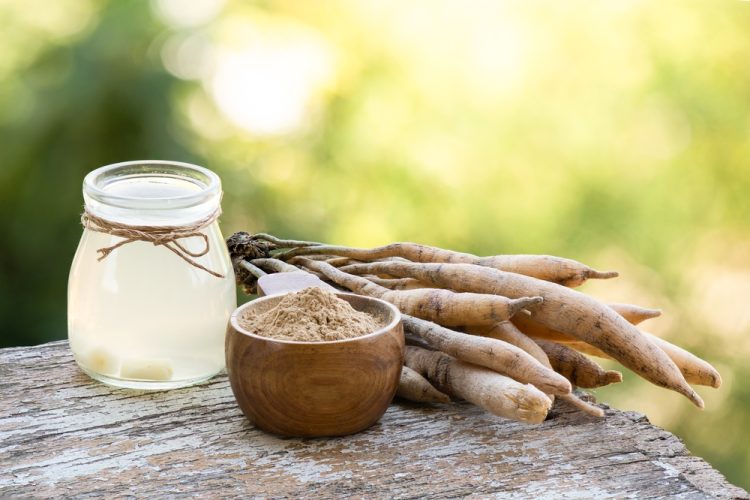Hot sweats, restless nights and feeling more anxiety, mood swings, bloating and fatigue are just some of the symptoms of menopause. But it doesn’t have to be like this!
By 2030 more than a billion women around the world are expected to be going through the menopause. Wowsers! -That’s a lot of us, and that means we definitely need some good, natural ways to handle menopause symptoms and regain balance and vitality during such a massive hormonal life shift. That’s also why managing menopause symptoms with Ayurveda is becoming increasingly popular.
Menopause is a transition that brings an array of physical and emotional changes. And important spiritual considerations too. While traditional medicine leans on hormone replacement therapy (HRT) – for menopause symptoms, which works for some, and definitely has its own pros and cons – more and more women are looking towards ancient, holistic systems like Ayurveda to navigate their menopause symptoms. They’re hoping for something gentler and something that actually uplifts and makes sense for their whole body.

Understanding Menopause Symptoms
Ayurveda is the ancient Indian natural way of caring for yourself. It means “the science of life” or “knowledge of life.” It doesn’t view menopause as a disease or a deficit, but as a natural and transformative phase, known as “Rajonivritti” (the cessation of menstruation). It’s perceived as a vital shift, marking a woman’s transition from the reproductive phase of life to a period of wisdom, spiritual growth, and increased self-focus.
While this stage is inherently natural, the abrupt changes can often lead to an accumulation of imbalances within the body’s fundamental energies, or doshas.
The Doshas and the Menopause
In Ayurvedic philosophy, life is governed by three primary doshas: Vata, Pitta, and Kapha. According to this ancient medicine the doshas also govern different seasons of our lives when they are more predominant.
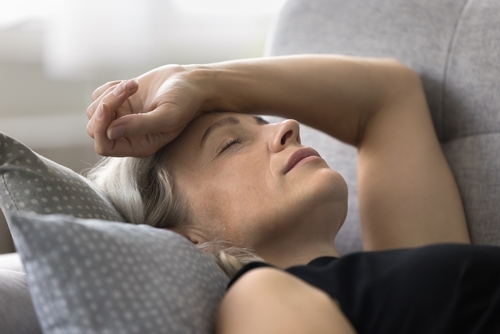
During menopause, there is a natural decline in Kapha (the energy of structure and lubrication) and an increase in Vata (the energy of movement and change)
Pitta (fire and water energy) is the predominant dosha in our childbearing years. This energy serves us well in our working years where we need the fire of action to get things done, or to provide for ourselves, or our families. However as we move towards a Vata time of life the main energy governing us shifts to Vata, or air and ether. So understanding how to live in harmony with this energy inside us, as it shifts and shapes us is vital.
This Vata surge, combined with potential lingering Pitta imbalances from the reproductive years, can manifest as the classic symptoms we associate with menopause: hot flashes, insomnia, anxiety, joint pain, dryness, and mood swings.

The Ayurvedic approach aims to rebalance these elemental energies, promoting internal harmony and allowing women to embrace their “second spring” – a time of renewed purpose and vitality – with more ease, comfort and an increased sense of well-being.
Treating Ayurvedic Peri-Menopausal and Menopause Symptoms
Ayurveda’s strength lies in its personalised approach. It recognises that each woman is unique, and her experience of menopause will vary based on her inherent constitution (Prakriti) and any current imbalances (Vikriti). What works for one woman might not be suitable for another, emphasising the need for the individualised care that only Ayurveda can offer.
In Ayurveda, tailored and individualised treatment is paramount. Menopause symptoms and imbalances and how each woman experiences menopause will be very different, based on their unique constitution (Prakriti) and imbalance (Vikriti). Both must be understood in order to design the most effective treatment for managing menopause symptoms.

How Menopause Symptoms And Doshic Imbalances Can Manifest During Menopause
Early menopause is known as peri-menopause in the West, a time when hormonal shifts in the body start to happen and these hormonal shifts and imbalances can manifest as the following peri-menopause symptoms and menopausal symptoms:
Vata Imbalance
As menopause progresses, Vata dosha naturally increases along with its qualities of lightness, dryness, coldness, movement, and changeability. When Vata becomes aggravated, it can lead to:
- Dryness: Vaginal dryness, dry skin, dry hair, brittle nails.
- Insomnia: Difficulty falling asleep, disturbed sleep, waking up frequently.
- Anxiety and Restlessness: Feeling agitated, worried, or unable to relax.
- Joint Pain: Aches and stiffness, particularly in the morning.
- Bloating and Constipation: Digestive irregularities.
- Memory Lapses and Difficulty Concentrating: “Brain fog.”
- Fatigue: Feeling drained and lacking energy.
- Depression: Feelings of sadness, hopelessness, or lack of interest in things you once loved.
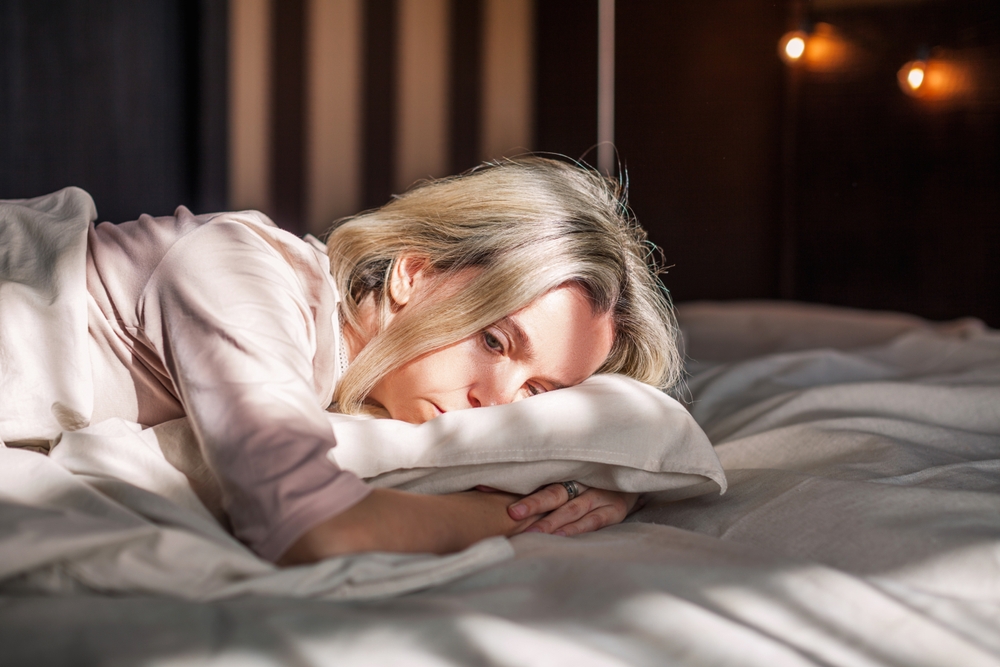
Pitta Imbalance
While menopause is primarily a Vata transition, Pitta, the dosha of transformation, metabolism, and heat, can also become aggravated. This is especially true for women who have a dominant Pitta constitution or have accumulated excess Pitta over their lives. Aggravated Pitta manifests as vasomotor symptoms and excess heat in the body. Other menopause symptoms include:
- Hot Flashes and Night Sweats: Sudden sensations of intense heat, often accompanied by sweating.
- Irritability and Anger: Short temper, easily frustrated.
- Acid Reflux and Heartburn: Digestive discomfort.
- Skin Rashes and Redness: Inflammatory skin conditions.
- Increased Thirst: Feeling dehydrated despite drinking water.
- Hair Thinning/Loss: Due to excess heat.
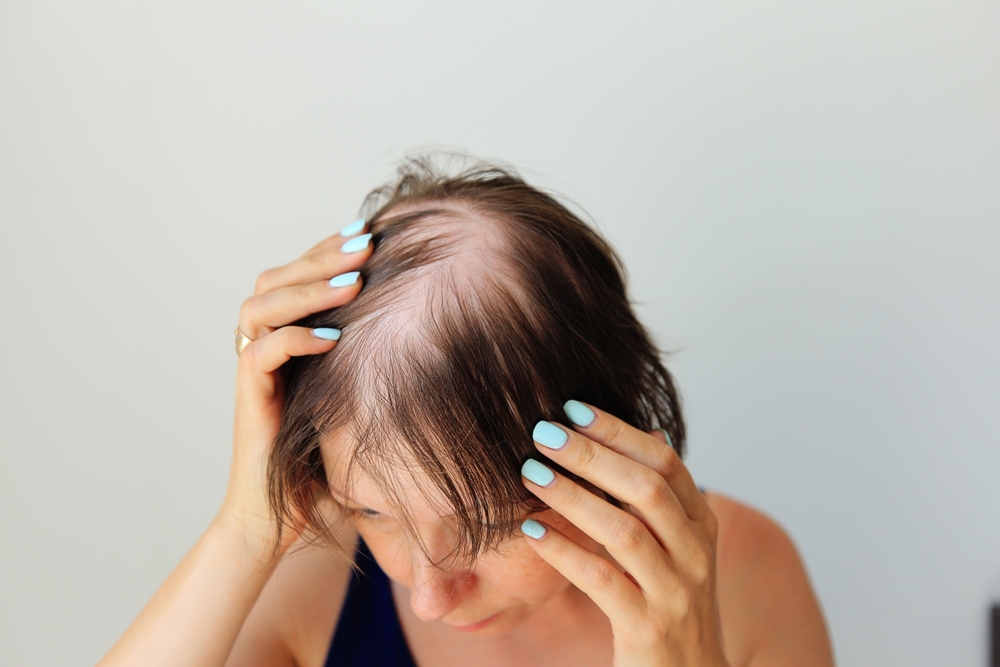
Kapha Imbalance
Although Kapha naturally decreases during menopause, an existing Kapha imbalance or a lifestyle that promotes Kapha can still contribute to symptoms. Aggravated Kapha may lead to:
- Weight Gain: Especially around the abdomen.
- Lethargy and Sluggishness: Feeling heavy, unmotivated, and tired.
- Fluid Retention and Swelling: Bloating.
- Depression and Emotional Heaviness: A feeling of sadness or lack of joy.
- High Cholesterol: Due to slower metabolism.
A review article in the Journal of Ayurveda and Integrative Medicine, sums up what Ayurvedic menopause management is all about, noting that “Ayurveda emphasises individualised care,” and “what works for one person may not work for another.” This personalised diagnostic framework is what sets Ayurveda apart and is crucial for a truly effective and successful Ayurvedic menopause management plan. An Ayurvedic practitioner will assess a woman’s unique doshic profile and current imbalances to create a tailored plan just for her.

The Power of Plants: Unveiling Ayurvedic Herbs for Menopause
The ancient texts of Ayurveda are rich with botanical knowledge, and modern clinical research is increasingly validating the traditional use of these herbs for menopausal symptoms. These herbs, known as rasayanas (rejuvenators), work synergistically to support the body’s natural healing processes and help to restore balance.
Shatavari
One of the most prominent is Shatavari A beautiful herb that is also lovingly referred to in Ayurveda as “she who has one hundred husbands!” It is known for its ability to support and nourish a woman’s reproductive system and vitality. It is primarily a Vata-Pitta pacifier, known for its cooling, moistening, and nourishing properties.
- A randomized, double-blind, placebo-controlled clinical trial involving 70 perimenopausal and menopausal women demonstrated significant improvements with Shatavari. Participants taking Shatavari experienced a 23.19% increase in total Utian Quality of Life (UQoL) scores after 30 days and a remarkable 35.13% improvement after 60 days.
- This particular study also reported “major reductions in hot flashes, with only 12.12% of participants reporting symptoms when the study ended,” compared to a higher percentage in the placebo group.
- Another comprehensive review highlighted Shatavari’s estrogenic properties, which help to alleviate symptoms caused by declining estrogen levels, such as hot flashes, night sweats, and vaginal dryness. It’s also praised for its ability to reduce stress and anxiety.
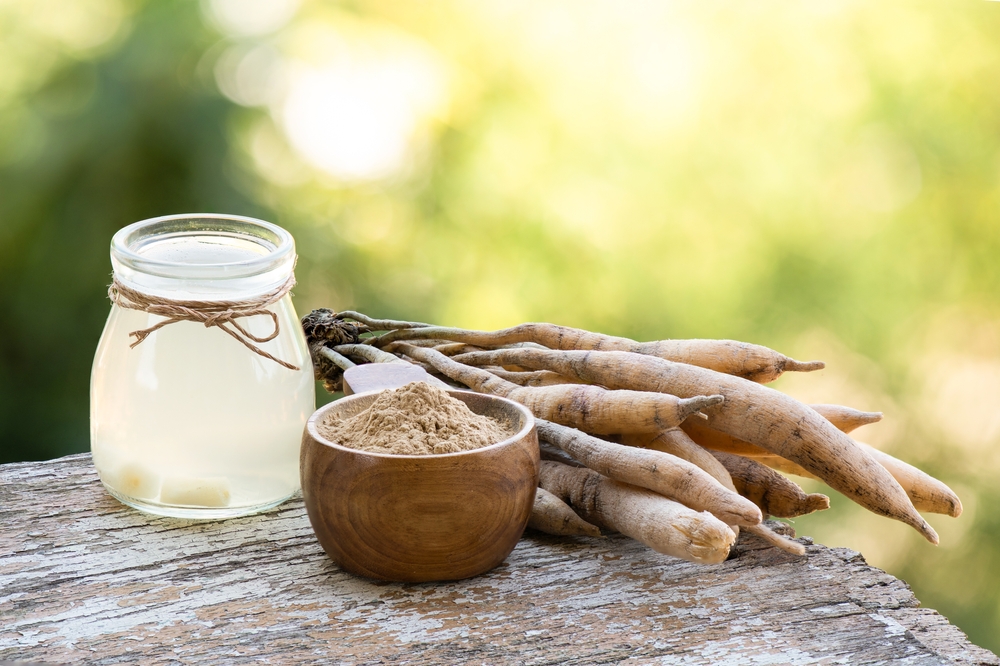
However Shatavari, isn’t suitable for everyone. Several other powerful herbs are frequently used in Ayurvedic protocols for menopause.
Ashwagandha
Often called “Indian Ginseng,” Ashwagandha is a powerful adaptogen. Adaptogens help the body adapt to stress, reduce cortisol levels, and support the adrenal glands, which play a crucial role in hormone balance. It is primarily a Vata and Kapha pacifier.
- A study published in the Journal of Clinical and Diagnostic Research indicated that Ashwagandha supplementation significantly reduced self-reported stress levels and improved overall quality of life in adults experiencing chronic stress. While not exclusively for menopause, its stress-reducing effects are highly beneficial during this transitional phase.
- Furthermore, research published in Phytotherapy Research showed that Ashwagandha could significantly improve mood, energy levels, and emotional stability in perimenopausal and menopausal women experiencing symptoms like anxiety and fatigue.
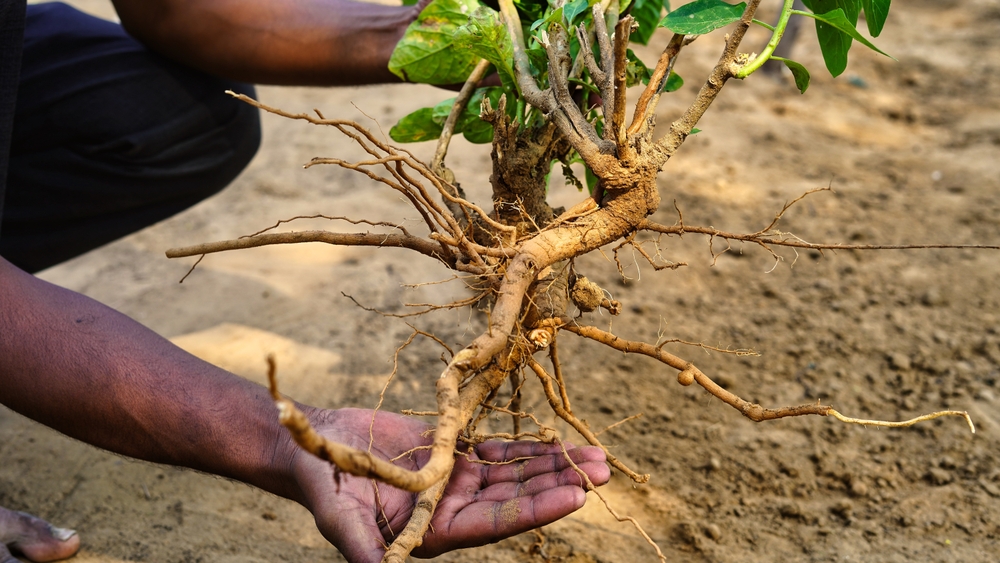
Guduchi
- Known as “Amrita” (the root of immortality), Guduchi is a potent immunomodulator and anti-inflammatory herb. It is primarily a Pitta and Kapha pacifier, with a bitter taste that helps cool excess heat in the body.
- Its cooling properties make it particularly effective for managing hot flashes, excessive sweating, and reducing inflammatory responses that can contribute to joint pain.
- Guduchi also supports liver function, crucial for detoxification and hormone metabolism.
Brahmi
A renowned nootropic, Brahmi is celebrated for its ability to enhance cognitive function, improve memory, and support emotional balance. It is a tridoshic herb, balancing all three doshas, but particularly beneficial for Vata and Pitta.
- For women experiencing “brain fog,” memory lapses, or mood swings during menopause, Brahmi can be invaluable. Studies have shown its potential to reduce anxiety and improve overall mental clarity.
Manjistha
This herb is an excellent blood purifier and lymphatic mover, effective for clearing toxins (ama) from the body. It helps in cooling excess Pitta, reducing skin eruptions, and supporting overall detoxification.
Aloe Vera
Often used internally as a juice, Aloe Vera is incredibly cooling and nourishing, excellent for balancing Pitta and soothing Vata dryness, particularly for vaginal dryness and internal heat.
Licorice
A sweet-tasting herb that has a balancing effect on hormones, particularly supportive of adrenal function and beneficial for soothing hot flashes and irritation. It is primarily a Vata and Pitta pacifier.
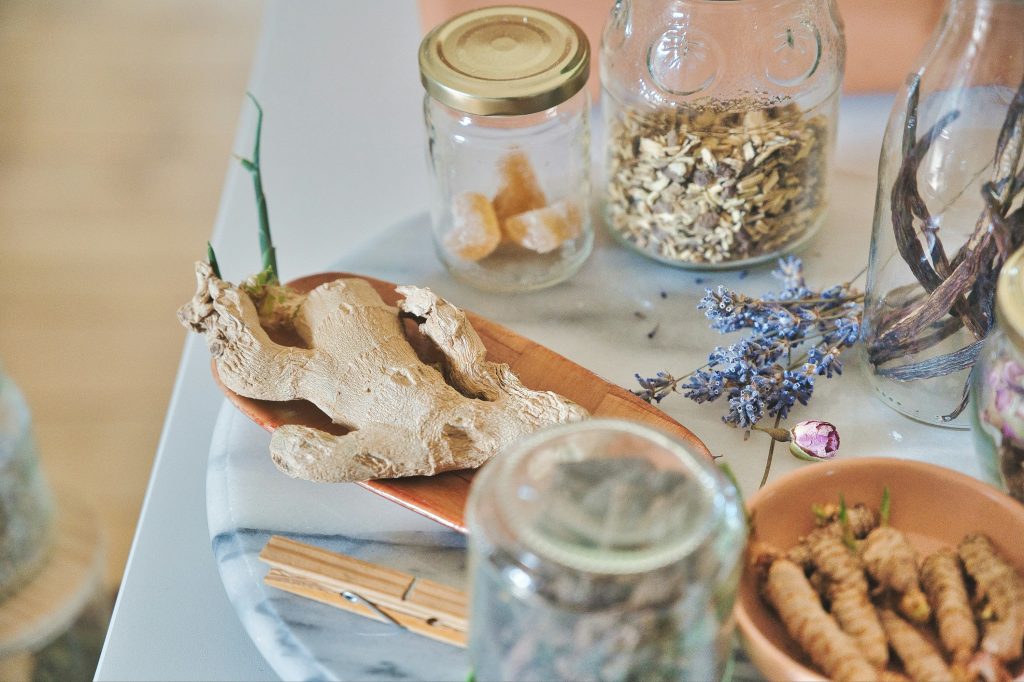
Ayurveda emphasises individualised care and herbs and lifestyle practices that work for one person may not work for another. This personalised approach is key to a successful Ayurvedic menopause management plan.
If you are looking for this kind of help in managing menopause symptoms and restoring balance. I would thoroughly recommend booking in for an Ayurvedic consultation.
Beyond Herbs: A Diet And Lifestyle Approach For Menopause
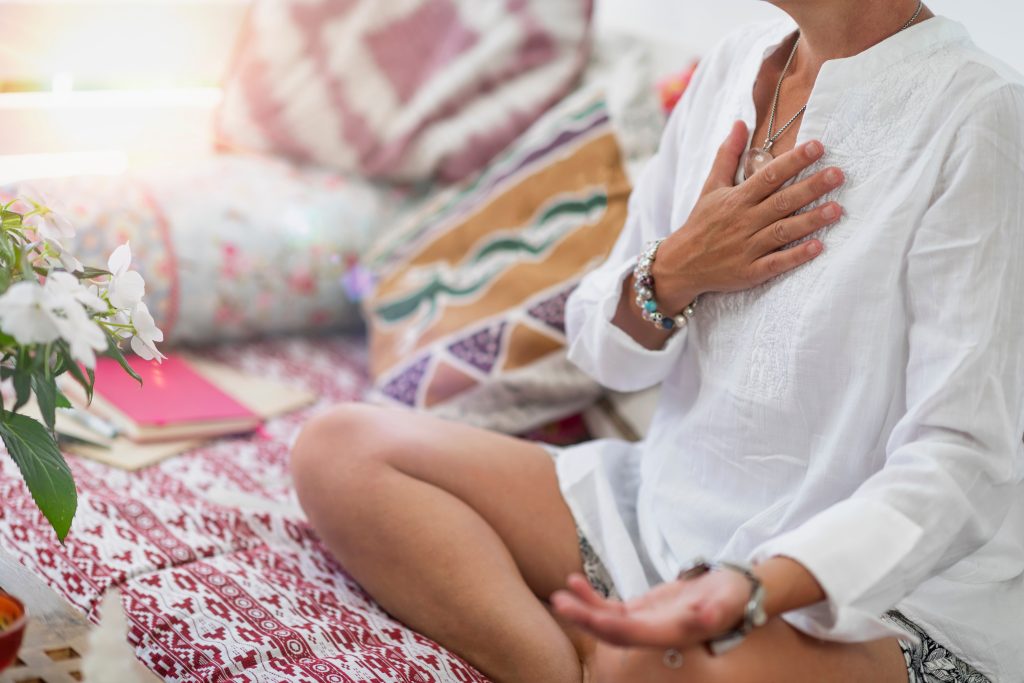
Ayurveda doesn’t stop at herbs: here are some useful tips to manage menopause:
Diet (Ahara)
Remember “You are what you eat!” Dietary recommendations to help balance individual doshas:
- Vata-pacifying: Focus on warm, cooked, nourishing foods with healthy fats like ghee. Examples include well-cooked grains, root vegetables, and grounding spices like cumin and fennel.
- Pitta-pacifying: Cooling, sweet, and astringent foods, while avoiding excessively spicy, sour, or salty items. Coconut oil, ghee, and fresh fruits like grapes and pomegranate are often recommended.
- Kapha-pacifying: Light, dry, and warm foods. Emphasis on fruits, vegetables, and legumes, while minimizing heavy dairy, red meat, and processed foods.
Lifestyle (Vihara)
Regular routines and self-care practices are crucial.
- Consistent Sleep: Prioritizing 7-8 hours of quality sleep nightly supports mood, energy, and overall health. Research suggests that women practicing yoga regularly have “better overall sleep quality” and “fewer instances of disturbed sleep.” Shirodara where warm oil is poured on the third eye is also a helpful treatment for insomnia and disturbed sleep.
- Stress Management: Menopause can heighten stress and anxiety. Ayurvedic practices like meditation, oil therapies and Pranayama (breathing exercises) are highly effective.
- Abhyanga (Self-Oil Massage): Daily oil massage at home and regular abhyanga massage with a qualified practitioner helps to soothe Vata, nourish the skin, improve circulation, and reduce anxiety.
- Gentle Exercise: Activities like yoga, walking, and Tai Chi help maintain flexibility, strength, and bone density, all crucial during menopause. Studies show that yoga can reduce joint and muscle aches, improve cognitive function, and support cardiovascular health.
Panchakarma
These detoxification and rejuvenation therapies, performed under the guidance of a qualified Ayurvedic practitioner, can be profoundly beneficial for cleansing the body and rebalancing doshas, particularly for addressing stubborn symptoms like hot flashes.

FAQS:
Can I start Ayurvedic treatment in peri-menopause?
Yes. Having Ayurvedic treatment for menopause when peri-menopausal symptoms begin, is incredibly beneficial in easing the shift and giving your body time to rebalance and readjust. Ayurvedic treatment is designed to be both preventative and curative in Ayurvedic Medicine. But if your menopause has already started don’t worry too, it’s never too late to start looking after yourself to give yourself the best possible transition and encourage good health in old age.
I want help with menopause symptoms, which appointment should I book?
Book in for the one hour Ayurvedic consultation to get help with diet and lifestyle or herbs for menopause symptoms.
Can I book in for a massage after the consultation?
Yes, I recommend that you book in for a full-body abhyanga. Many of my menopausal clients report really benefiting from the Ayurvedic face massage too. I can include excellent marma points for menopause symptoms in the treatment.
Disclaimer: This blog post is for informational purposes only and does not constitute medical advice. Always consult with a qualified healthcare professional or Ayurvedic practitioner before making any changes to your healthcare routine.

